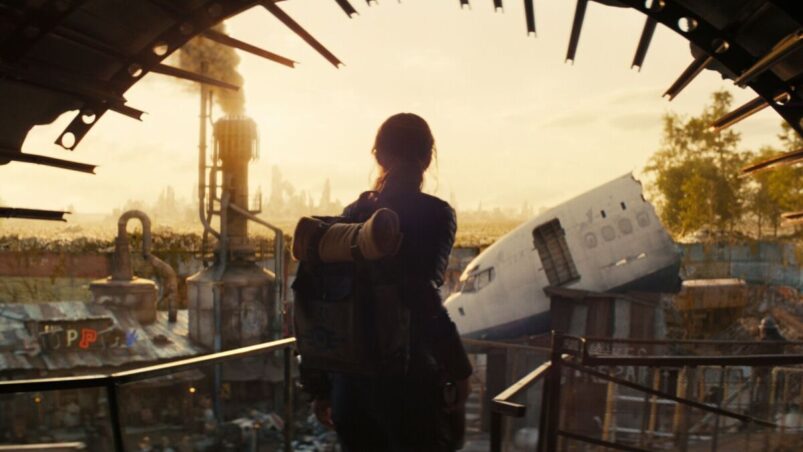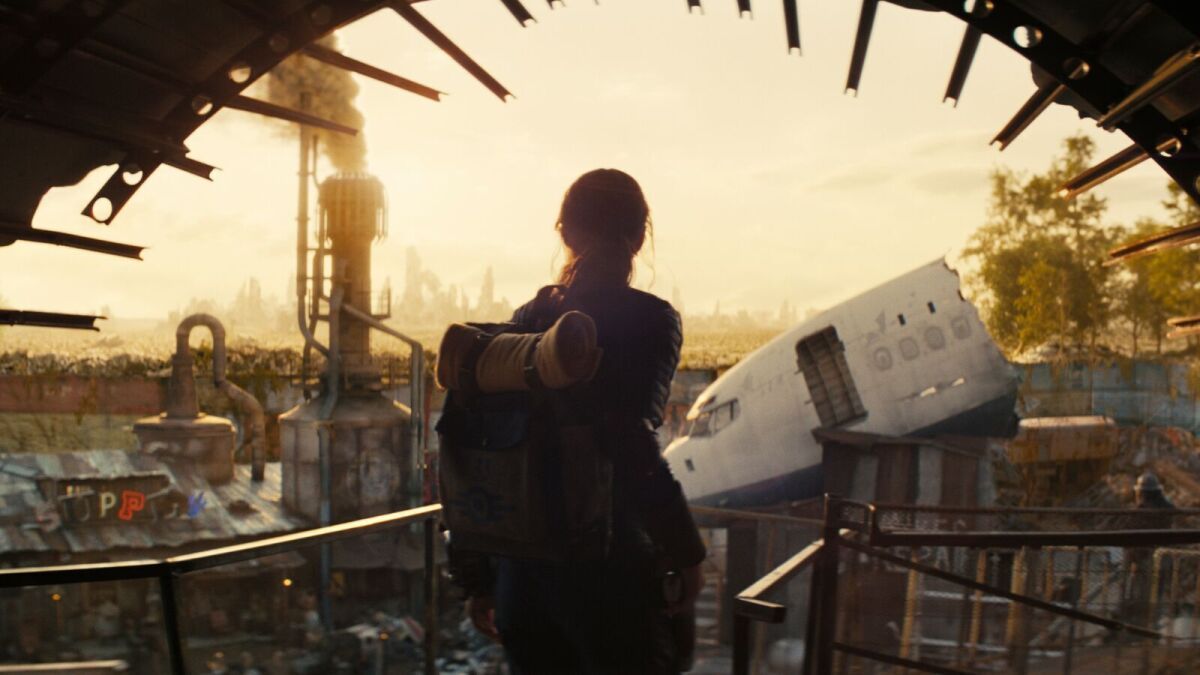Lisa Joy and Jonathan Nolan, showrunners of the Fallout TV adaptation, are best known for that exercise in diminishing returns Westworld, and it’s impossible not to see similarities. The self-conscious wild west vibes, the bordering-on-magic technology – at one time I dinged Westworld for including video-game-style healing items, Fallout at least has an ironclad reason to do that.
Jolan/Noy have clearly learned at least some lessons from their past experiences. Like Westworld, Fallout has a couple of underlying mysteries – but these ones have clear and concrete stakes, questions, and answers, rather than desperately solipsistic pondering on the nature of artificial intelligence. Nor does the split timeline get so complicated that it disappears squarely up its own arse before the viewers’ increasingly jaded eyes while Ed Harris flatly tells someone “You don’t get it”, again.
Speaking of Harris, here Walton Goggins makes for a fantastic Man In Black figure, indomitable and amorally charming as he gunslings through the irradiated west. The issue, if any, is that Goggins is too good. He shares top billing with young John Actor and a castoff Doctor Who companion, in much the same way as the winner of a Grand Prix shares the podium. My notes mention that Goggins’ onscreen wife has to put on a high-tier performance – significantly better than his two co-leads, even – simply to keep up.
This isn’t even to say that the other two leads are strictly bad, just that they can’t help but suffer by comparison. And Goggins does have the distinct advantage that if anyone here represents the player character of the games, then as a trigger-happy sociopath roaming the wasteland, it’s definitely him. The obvious discrepancy between Goggins and those other, non-Goggins actors is at least alleviated by their circumstances: those plucky kids are playing, well, plucky kids, doing what any wide-eyed naif might do in their postapocalyptic shoes, whereas Goggins’s is a role that demands a bit more dramatic chops. Which, naturally, he can more than provide.
Lest this whole review becomes me gushing about how it should have been Fallout: New Goggins, I will summarise with the following detail – at one point, Goggins shares a scene with the sonorous Matt Berry, both as jaded drunk actors. Suffice it to say such a concept could have floated a show all of its own.
But, of course, this is self-evidently something we can say of the broader Fallout franchise as well. Any money spent on the sets and costumes here was a waste, since the fans would have made them with loving care for the sheer joy of it. Though this does obviously come with a built-in audience, it handles the worldbuilding artfully enough that newcomers won’t find themselves completely lost, without the need for any laborious exposition. It’s even curiously reticent to make too much of Fallout’s cartoon mascot Vault Boy, who’s mainly present as something like a loading screen on people’s wrist-mounted supercomputers.
While the bulk of the worldbuilding is decidedly from after the end, the show clearly enjoys building the retrofuturistic world of before the bombs all dropped, that pseudo1950s that Fallout has always loved. And this is reflected all too clearly in the music choices, a decent slice of era-appropriate Americana, that doesn’t just repeat the favourite numbers from the games (though I was halfway hoping they’d make use of OST smash hits ‘Big Iron‘ or ‘Uranium Fever‘).
The pitch-black comedy of the games, too, is something recreated incredibly well here – be it the horror of just what’s actually going on in the vaults, or the gibs-heavy violence. It would be a tragic mistake to try and take the splattery action scenes completely seriously. But nor does this then reduce everything into blithe lightheartedness, which is the risk when the violence gets quite so cartoony.
It’s always a fine line between ‘lots of people die (hilariously)’ and ‘lots of people die (tragically)’, and the execution’s easy to fluff. But this is of course a tension the Fallout franchise has been exploiting since the beginning, and so I must again give Joy and Nolan credit for working with the source material, rather than the usual adaptor’s fallacy of trying to better it and bungling the process badly.
(To be fair, Westworld didn’t fall into that trap either, but did quickly extend beyond its source material – and anyone’s willing suspension of disbelief.)
The action scenes are prone to reality-bending material, like someone taking a flying leap and somehow stopping dead in midair, or automatic gunfire managing to miss a man walking slowly away. You could justify this by saying Fallout’s included much sillier things – which is true – but given that the show makes much of the brutal, meathook realities of the wasteland it can feel like a bit of a reach.
Much of this is down to the nature of special effects, and with a production like this, for every duff moment there’s probably fourteen or fifteen uses of CGI you’ll have taken for the real thing. Though particularly glaring is the Brotherhood of Steel’s power armour when they try to run: it just looks weightless and slowed-down, more like a diving suit or spacesuit than the battle-droid effect they’re going for.
And like Westworld, Fallout runs into difficulty trying to give a proper sense of place. Wooded forest environs give way to vast expanses of desert between scenes, and all the main characters seem to gravitate to the same set-piece locales, even when they don’t have the benefit of a techno-magic tracking device. The idea of wandering off into the open-world wasteland, before you’ve unlocked all the map, is of course in the spirit of the games on which it’s based. Still, this is one aspect which doesn’t translate too readily to the small screen. Any idea of the distances and scales of the journeys shown, or that the occasionally-referenced supplies actually matter, only really results in a shrug.
Would I typically ding a show for these plot-friendly sleights of hand? Perhaps not, but as I’ve mentioned before, Fallout does make much mention of the uncaring brutality of the wasteland. And it manages some of its strongest moments when that’s actually being demonstrated, rather than being set dressing our heroes marvel at as they wander past.
Like the best adaptations, Fallout works not because it slavishly recreates the plot of the work on which it’s based – it doesn’t – but because it’s doing its utmost to capture the same spirit, and largely succeeds. The mix of old west cowboyin’ and pulpy sci-fi fun that made the games the success they are is present and correct here, and is as enjoyable to watch as it was to play out.
READ NEXT: 10 PS2 Games That Actually Need A Remake
Some of the coverage you find on Cultured Vultures contains affiliate links, which provide us with small commissions based on purchases made from visiting our site. We cover gaming news, movie reviews, wrestling and much more.




